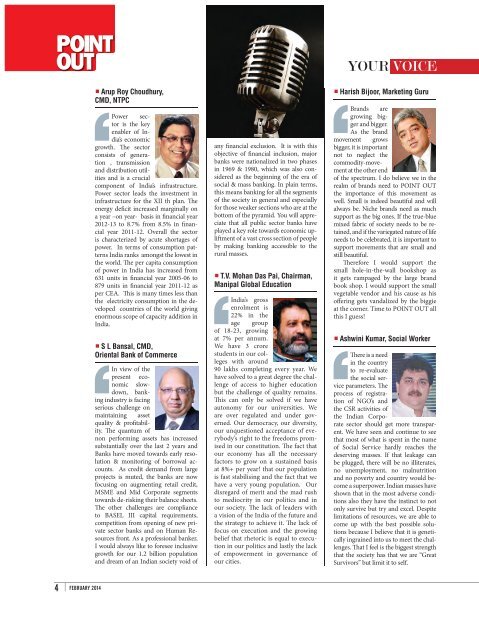POINT OUT
You also want an ePaper? Increase the reach of your titles
YUMPU automatically turns print PDFs into web optimized ePapers that Google loves.
<strong>POINT</strong><br />
<strong>OUT</strong><br />
• Arup Roy Choudhury,<br />
CMD, NTPC<br />
‘Power sector<br />
is the key<br />
enabler of India’s<br />
economic<br />
growth. The sector<br />
consists of generation<br />
, transmission<br />
and distribution utilities<br />
and is a crucial<br />
component of India’s infrastructure.<br />
Power sector leads the investment in<br />
infrastructure for the XII th plan. The<br />
energy deficit increased marginally on<br />
a year –on year- basis in financial year<br />
2012-13 to 8.7% from 8.5% in financial<br />
year 2011-12. Overall the sector<br />
is characterized by acute shortages of<br />
power. In terms of consumption patterns<br />
India ranks amongst the lowest in<br />
the world. The per capita consumption<br />
of power in India has increased from<br />
631 units in financial year 2005-06 to<br />
879 units in financial year 2011-12 as<br />
per CEA. This is many times less than<br />
the electricity consumption in the developed<br />
countries of the world giving<br />
enormous scope of capacity addition in<br />
India.<br />
• S L Bansal, CMD,<br />
Oriental Bank of Commerce<br />
‘In view of the<br />
present economic<br />
slowdown,<br />
banking<br />
industry is facing<br />
serious challenge on<br />
maintaining asset<br />
quality & profitability.<br />
The quantum of<br />
non performing assets has increased<br />
substantially over the last 2 years and<br />
Banks have moved towards early resolution<br />
& monitoring of borrowal accounts.<br />
As credit demand from large<br />
projects is muted, the banks are now<br />
focusing on augmenting retail credit,<br />
MSME and Mid Corporate segments<br />
towards de-risking their balance sheets.<br />
The other challenges are compliance<br />
to BASEL III capital requirements,<br />
competition from opening of new private<br />
sector banks and on Human Resources<br />
front. As a professional banker,<br />
I would always like to foresee inclusive<br />
growth for our 1.2 billion population<br />
and dream of an Indian society void of<br />
any financial exclusion. It is with this<br />
objective of financial inclusion, major<br />
banks were nationalized in two phases<br />
in 1969 & 1980, which was also considered<br />
as the beginning of the era of<br />
social & mass banking. In plain terms,<br />
this means banking for all the segments<br />
of the society in general and especially<br />
for those weaker sections who are at the<br />
bottom of the pyramid. You will appreciate<br />
that all public sector banks have<br />
played a key role towards economic upliftment<br />
of a vast cross section of people<br />
by making banking accessible to the<br />
rural masses.<br />
• T.V. Mohan Das Pai, Chairman,<br />
Manipal Global Education<br />
‘India’s gross<br />
enrolment is<br />
22% in the<br />
age group<br />
of 18-23, growing<br />
at 7% per annum.<br />
We have 3 crore<br />
students in our colleges<br />
with around<br />
90 lakhs completing every year. We<br />
have solved to a great degree the challenge<br />
of access to higher education<br />
but the challenge of quality remains.<br />
This can only be solved if we have<br />
autonomy for our universities. We<br />
are over regulated and under governed.<br />
Our democracy, our diversity,<br />
our unquestioned acceptance of everybody’s<br />
right to the freedoms promised<br />
in our constitution. The fact that<br />
our economy has all the necessary<br />
factors to grow on a sustained basis<br />
at 8%+ per year! that our population<br />
is fast stabilising and the fact that we<br />
have a very young population. Our<br />
disregard of merit and the mad rush<br />
to mediocrity in our politics and in<br />
our society. The lack of leaders with<br />
a vision of the India of the future and<br />
the strategy to achieve it. The lack of<br />
focus on execution and the growing<br />
belief that rhetoric is equal to execution<br />
in our politics and lastly the lack<br />
of empowerment in governance of<br />
our cities.<br />
YOUR VOICE<br />
• Harish Bijoor, Marketing Guru<br />
‘Brands are<br />
growing bigger<br />
and bigger.<br />
As the brand<br />
movement grows<br />
bigger, it is important<br />
not to neglect the<br />
commodity-movement<br />
at the other end<br />
of the spectrum. I do believe we in the<br />
realm of brands need to <strong>POINT</strong> <strong>OUT</strong><br />
the importance of this movement as<br />
well. Small is indeed beautiful and will<br />
always be. Niche brands need as much<br />
support as the big ones. If the true-blue<br />
mixed fabric of society needs to be retained,<br />
and if the variegated nature of life<br />
needs to be celebrated, it is important to<br />
support movements that are small and<br />
still beautiful.<br />
Therefore I would support the<br />
small hole-in-the-wall bookshop as<br />
it gets rampaged by the large brand<br />
book shop. I would support the small<br />
vegetable vendor and his cause as his<br />
offering gets vandalized by the biggie<br />
at the corner. Time to <strong>POINT</strong> <strong>OUT</strong> all<br />
this I guess!<br />
• Ashwini Kumar, Social Worker<br />
‘There is a need<br />
in the country<br />
to re-evaluate<br />
the social service<br />
parameters. The<br />
process of registration<br />
of NGO’s and<br />
the CSR activities of<br />
the Indian Corporate<br />
sector should get more transparent.<br />
We have seen and continue to see<br />
that most of what is spent in the name<br />
of Social Service hardly reaches the<br />
deserving masses. If that leakage can<br />
be plugged, there will be no illiterates,<br />
no unemployment, no malnutrition<br />
and no poverty and country would become<br />
a superpower. Indian masses have<br />
shown that in the most adverse conditions<br />
also they have the instinct to not<br />
only survive but try and excel. Despite<br />
limitations of resources, we are able to<br />
come up with the best possible solutions<br />
because I believe that it is genetically<br />
ingrained into us to meet the challenges.<br />
That I feel is the biggest strength<br />
that the society has that we are “Great<br />
Survivors” but limit it to self.<br />
4<br />
FEBRUARY 2014





